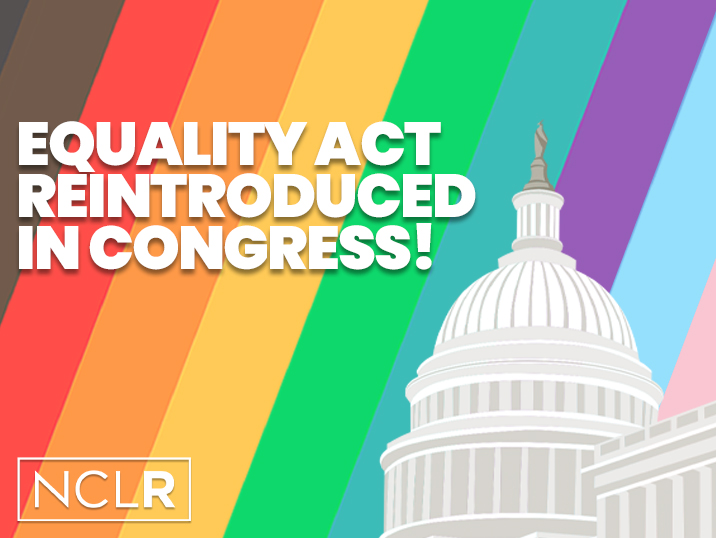FOR IMMEDIATE RELEASE
February 18, 2021
CONTACTS:
Christopher Vasquez, NCLR Communications Director
415.365.1337 | cvasquez@nclrights.org
If passed, historic legislation would bar discrimination against LGBTQ individuals, women, and people of color in education, employment, housing, credit, public accommodations, and other aspects of everyday life
WASHINGTON, DC – Today, NCLR lauded the reintroduction of the Equality Act (H.R. 5), a comprehensive federal civil rights bill that would create permanent protections for LGBTQ individuals, women, and people of color from discrimination in seven critical sectors, including healthcare, housing, education, employment, federal funding, and public accommodations. The bill was passed by the House of Representatives in the last Congress with a bipartisan vote of 236 to 173 but was blocked from consideration in the Senate by then-Majority Leader Mitch McConnell.
“Today’s reintroduction of the Equality Act by a broad coalition in Congress starts to carve a clear path to LGBTQ equality and marks a new day for our country. The harsh reality is that current anti-discrimination protections fall far short of protecting everyone in our communities, leaving behind LGBTQ people and people of color who continue to face disproportionate discrimination in nearly every aspect of their lives. The Equality Act builds on the important legacy of the Civil Rights Act of 1964 and would provide nondiscrimination protections that include LGBTQ people for the very first time, while also extending protections to the most underrepresented in our communities in housing, healthcare, education, and other vital parts of everyday life.”
Imani Rupert-Gordon, NCLR Executive Director
“Broad nondiscrimination protections in housing, education, social services, and other areas of life included in the Equality Act are on a long list of changes needed to ensure the basic needs of low-income LGBTQ people and families are addressed. Far too often, low-income LGBTQ people and families are at the mercy of the powerful and privileged who can literally make life-or-death decisions about their lives. No one should have the power to deny others their basic needs, including on the basis of gender identity and sexual orientation. Every person deserves to have their needs met as a matter of human dignity – and the Equality Act would help ensure that for many of the most vulnerable in America.”
Tyrone Hanley, NCLR Senior Policy Counsel
Currently, only 22 states have non-discrimination protections that fully protect LGBTQ individuals. According to the Center for American Progress, more than 1 in 3 LGBTQ Americans have reported facing some form of discrimination within the past year, with the number increasing to 3 in 5 for transgender individuals. This discrimination often causes substantial harm to the psychological and economic wellbeing of the LGBTQ community and creates undue difficulties for many LGBTQ people in accessing medically necessary healthcare – most dramatically for the transgender population and people of color.
The most recent polling from the nonpartisan Public Religion Research Institute (PRRI) shows that more than 80 percent of all Americans (including a majority of Democrats, Independents, and Republicans) support comprehensive nondiscrimination protections that include LGBTQ individuals. FiveThirtyEight has also similarly found that President Biden’s executive order mandating that federal agencies implement the Supreme Court’s ruling in Bostock v. Clayton County in nondiscrimination policies was the most popular of his early executive actions, with the support of an overwhelming 83% of Americans.
More than 600 national, state, and local organizations have signed on to urge the swift passage of the Equality Act, in addition to a broad coalition of faith-based groups and 335 major corporations, showing the breadth of support the legislation has maintained since its passage in the House in 2019.
# # #
The National Center for Lesbian Rights (NCLR) is a national legal organization committed to advancing the human and civil rights of the lesbian, gay, bisexual, transgender, and queer community through litigation, public policy advocacy, and public education. Since its founding, NCLR has maintained a longstanding commitment to racial and economic justice and the LGBTQ community’s most vulnerable. https://www.nclrights.org/










